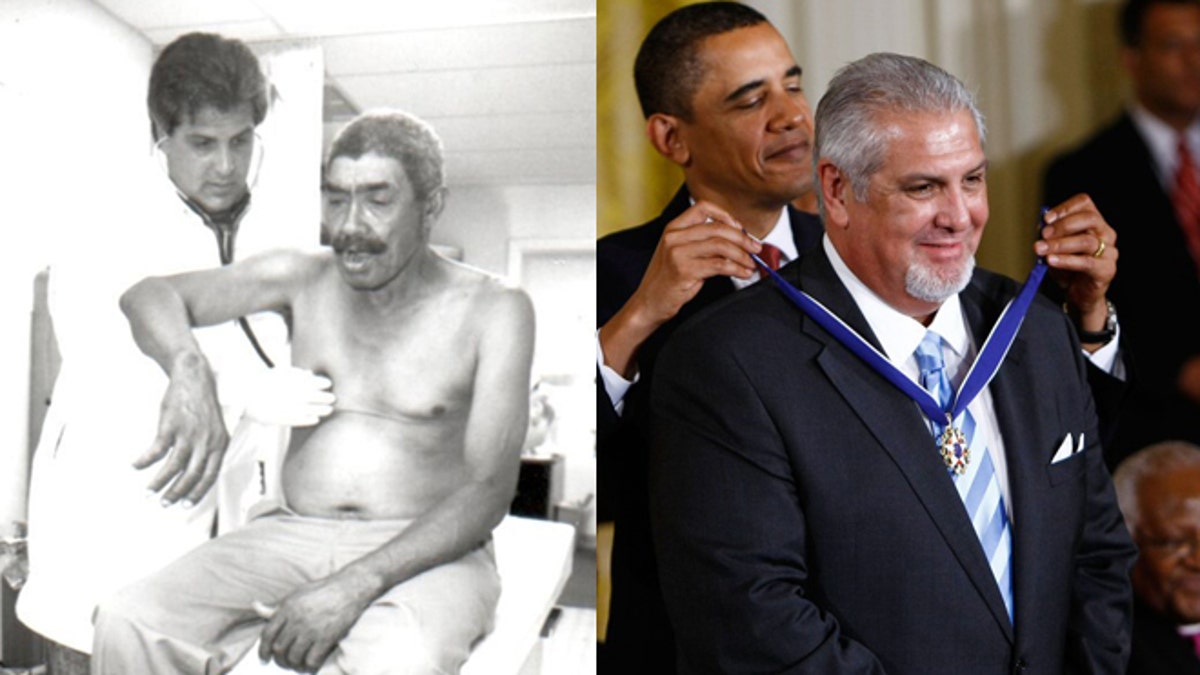
If only he was there to save her.
Dr. Pedro José Greer Jr. was just a 23-year-old medical student, the middle child of three, and the only boy in his Cuban immigrant home, when he heard the phone ring on a breezy November day in 1979. His sister, Chichi, was driving home to Miami to celebrate her 18th birthday on the week of Thanksgiving when her car flipped over on a Palm Beach highway. She died. Three other students in the car survived.
The loss sent a “cold shiver” through Greer’s spine.
He failed to protect his little sister, he thought. If it were not for his family, the pain would be unbearable, and it was that realization that pushed him to make the ultimate promise.
“I promised my sister and God that if I ever became a doctor I would not let anyone die or suffer alone,” Dr. Greer told Fox News Latino. “You make a promise to God, there are not many places you can hide.”
Give Me Your Poor, Sick
For more than a quarter century, Greer’s promise would be put to the test – time and time again – as a doctor at Jackson Memorial Hospital in Miami. It was at Jackson, a public hospital, where Greer was accidentally born in 1956 when his seven month pregnant mother visited South Florida on a one-day trip to visit her grandfather. It was there where he began a career dedicated to the forgotten souls – the downtrodden – found in the streets of America’s ‘Paradise Lost:’ drug addicts, alcoholics, hookers, runaways and the homeless.
The neighborhoods served as his hospitals. The streets his waiting rooms. The dark lonely crevices underneath overpasses, his patient rooms.
"I used to go on rounds in street clothes," Greer said, "until a homeless man pulled a gun on me, and didn't believe I was Dr. Joe. Since then, I wore my white coat."
But for every frightening story, there are countless more lessons Greer learned by tending to Miami’s homeless. Like the man who taught him "integrity is what you do when no one is looking." Or how the pregnant woman who lived under a bridge, he remembers, put his worries about paying for his soon-to-be newborn son's college education seem minuscule.
Dr. Greer would go on to dedicate his career to the uninsured for more than two decades in a private practice – while also offering basic health care services to thousands of Miami's homeless as the founder of Camillus Health Concern, a private non-profit Catholic charity named after his sister Chichi. Established in 1984, Camillus Health Concern, which is made up of doctors who began offering basic food services, has now grown to offer health care services to 10,000 homeless people a year at its health center.
He also created the St. John Bosco Clinic, which serves disadvantaged people in Little Havana.
But he was more than just a doctor who fixed broken arms and helped children with diabetes. He went out to communities to figure out the root of the problems in the household – to try and work on prevention rather than tending to them when they visit a clinic or hospital.
Dr. Joe eventually moved on to advise the Clinton and Bush administrations on health care reform. In 1993, he was awarded the MacArthur genius grant and six years later was awarded the Presidential Medal of Freedom, the highest civilian award given by the president of the United States. Recently, he received the Great Floridian Award.
Greer, a father of two, considers his family and wife of 32 years his greatest accomplishment.
Where It All Began
Greer’s mission to help Miami's poor began with Bed 9 at Jackson Memorial Hospital in 1984.
"The man was dying of tuberculosis, spread all over his body – not just in his lungs," Greer recalled. "This is a disease in third world countries."
The man's wristband read "No Address." And despite receiving 24/7 care, with the best technology and best doctors, he eventually died.
The experience opened his eyes to the plight of Miami's poor. The man with no address also had no visitors. The man’s death challenged any pre-conceptions about the poor and helped shape his eventual health care philosophy.
"Disease, 80 percent of the time, is a consequence of something other than genetics and biology," Dr. Greer said. "And if the cause is social, then the answer must be social."
Miami, the Perfect Classroom
Today, Greer, the Chair of the Department of Humanities, Health and Society at Florida International University’s School of Medicine, is busy guiding a new generation of doctors.
Following Greer's footsteps, student doctors, lawyers, and social workers go into the poorest neighborhoods in Miami and learn to take care of individual families for at least four years. The program puts the household and doctor-family relationships at the center of health care – with the understanding that a healthy family is centered around social and economic stability.
"If a family is in foreclosure, we have the law students take care of that, we help families get on Medicaid," Dr.Greer said."We (FIU) produce an army of physicians that take care of patients without prejudice."
Greer calls it social intervention, and credits the program that emphasizes prevention with reducing ER usage from 61 to 26 percent in some areas.
"One illness can disrupt the entire dynamics of the family," Greer said. "If you are the bread winner and sick, it upsets the entire family. It's a chain reaction."








































